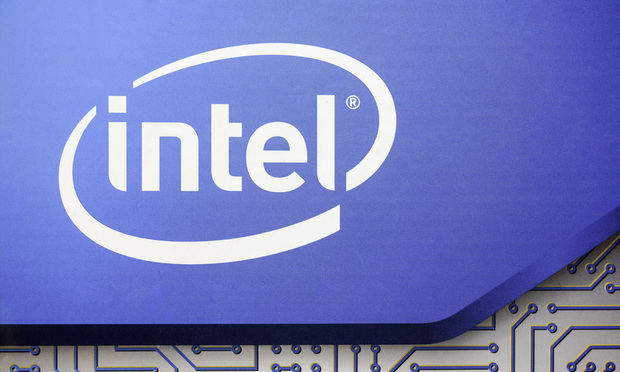Racing to Fix Security Flaws, Intel Hit With First Class Action
As the company scrambles to patch vulnerabilities that affect processors used widely throughout the computer industry, it faces at least one class action lawsuit and the prospect of more.
January 04, 2018 at 03:00 PM
3 minute read

Add this to the headaches facing Intel Corp. as reports roll in about the vulnerability of the company's computer chips: The company was hit with a class action lawsuit claiming it doesn't have a viable fix for defective x86-64x processors, and the proposed patches will degrade the performance of devices that use them.
The class action complaint filed Wednesday in U.S. District Court for the Northern District of California by lawyers at Doyle APC in San Diego, the Law Office of James R. Hail in Chula Vista and Branstetter, Stranch & Jennings in Nashville, Tennessee, quotes heavily from a Jan 2. report from online tech publication The Register, which said “a fundamental design flaw in Intel's processor chip” left the industry scrambling to “defang the chip-level security bug.” The vulnerability could leave users' sensitive data, such as passwords and log-in keys, open to hacking.
The Register reported that updates to both Linux and Windows operating systems addressing the issue are expected to slowdown machines with Intel chips by 5 percent to 30 percent, depending on the task and processor model.
“In essence, Intel x86-64x CPU owners are left with the unappealing choice of either purchasing a new processor or computer containing a CPU that does not contain the defect, or continuing to use a computer with massive security vulnerabilities or one with significant performance degradation,” the complaint said.
Intel publicly acknowledged the issue Wednesday and said it's working with other chipmakers, including AMD and ARM Holdings, as well as operating system makers, “to develop an industrywide approach to resolve this issue promptly and constructively.” Intel, however, claimed the performance impacts “should not be significant and will be mitigated with time.” Company representatives didn't respond to an email message seeking comment on the lawsuit.
Chris Cantrell of Doyle APC, one of the lawyers who filed suit Wednesday, said he expects many more suits to be filed on behalf of consumers and businesses against Intel in the coming days and weeks—especially since cloud computing services hosted by Amazon, Google and Microsoft are expected to be impacted by the security fixes.
“I fully expect there to be additional filings and that this will go the usual route of multidistrict litigation,” Cantrell said. “Just the sheer number of devices that we're talking about … Most of the desktop and laptop computers in use today.”
This content has been archived. It is available through our partners, LexisNexis® and Bloomberg Law.
To view this content, please continue to their sites.
Not a Lexis Subscriber?
Subscribe Now
Not a Bloomberg Law Subscriber?
Subscribe Now
NOT FOR REPRINT
© 2025 ALM Global, LLC, All Rights Reserved. Request academic re-use from www.copyright.com. All other uses, submit a request to [email protected]. For more information visit Asset & Logo Licensing.
You Might Like
View All


TikTok Hit With California Class Action for Allegedly Mining Children's Data Without Parental Consent

Khan Defends FTC Tenure, Does Not Address Post-Inauguration Plans
Trending Stories
- 1Many LA County Law Firms Remain Open, Mobilize to Support Affected Employees Amid Historic Firestorm
- 2Stevens & Lee Names New Delaware Shareholder
- 3U.S. Supreme Court Denies Trump Effort to Halt Sentencing
- 4From CLO to President: Kevin Boon Takes the Helm at Mysten Labs
- 5How Law Schools Fared on California's July 2024 Bar Exam
Who Got The Work
Michael G. Bongiorno, Andrew Scott Dulberg and Elizabeth E. Driscoll from Wilmer Cutler Pickering Hale and Dorr have stepped in to represent Symbotic Inc., an A.I.-enabled technology platform that focuses on increasing supply chain efficiency, and other defendants in a pending shareholder derivative lawsuit. The case, filed Oct. 2 in Massachusetts District Court by the Brown Law Firm on behalf of Stephen Austen, accuses certain officers and directors of misleading investors in regard to Symbotic's potential for margin growth by failing to disclose that the company was not equipped to timely deploy its systems or manage expenses through project delays. The case, assigned to U.S. District Judge Nathaniel M. Gorton, is 1:24-cv-12522, Austen v. Cohen et al.
Who Got The Work
Edmund Polubinski and Marie Killmond of Davis Polk & Wardwell have entered appearances for data platform software development company MongoDB and other defendants in a pending shareholder derivative lawsuit. The action, filed Oct. 7 in New York Southern District Court by the Brown Law Firm, accuses the company's directors and/or officers of falsely expressing confidence in the company’s restructuring of its sales incentive plan and downplaying the severity of decreases in its upfront commitments. The case is 1:24-cv-07594, Roy v. Ittycheria et al.
Who Got The Work
Amy O. Bruchs and Kurt F. Ellison of Michael Best & Friedrich have entered appearances for Epic Systems Corp. in a pending employment discrimination lawsuit. The suit was filed Sept. 7 in Wisconsin Western District Court by Levine Eisberner LLC and Siri & Glimstad on behalf of a project manager who claims that he was wrongfully terminated after applying for a religious exemption to the defendant's COVID-19 vaccine mandate. The case, assigned to U.S. Magistrate Judge Anita Marie Boor, is 3:24-cv-00630, Secker, Nathan v. Epic Systems Corporation.
Who Got The Work
David X. Sullivan, Thomas J. Finn and Gregory A. Hall from McCarter & English have entered appearances for Sunrun Installation Services in a pending civil rights lawsuit. The complaint was filed Sept. 4 in Connecticut District Court by attorney Robert M. Berke on behalf of former employee George Edward Steins, who was arrested and charged with employing an unregistered home improvement salesperson. The complaint alleges that had Sunrun informed the Connecticut Department of Consumer Protection that the plaintiff's employment had ended in 2017 and that he no longer held Sunrun's home improvement contractor license, he would not have been hit with charges, which were dismissed in May 2024. The case, assigned to U.S. District Judge Jeffrey A. Meyer, is 3:24-cv-01423, Steins v. Sunrun, Inc. et al.
Who Got The Work
Greenberg Traurig shareholder Joshua L. Raskin has entered an appearance for boohoo.com UK Ltd. in a pending patent infringement lawsuit. The suit, filed Sept. 3 in Texas Eastern District Court by Rozier Hardt McDonough on behalf of Alto Dynamics, asserts five patents related to an online shopping platform. The case, assigned to U.S. District Judge Rodney Gilstrap, is 2:24-cv-00719, Alto Dynamics, LLC v. boohoo.com UK Limited.
Featured Firms
Law Offices of Gary Martin Hays & Associates, P.C.
(470) 294-1674
Law Offices of Mark E. Salomone
(857) 444-6468
Smith & Hassler
(713) 739-1250






